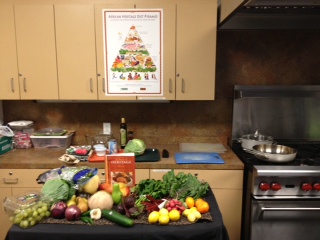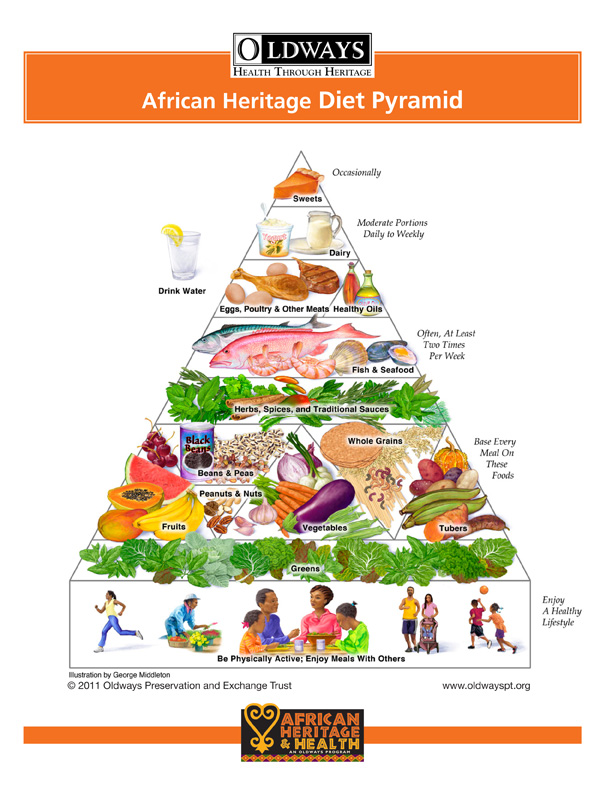Oldways national cooking and wellness program, A Taste of African Heritage, has offcially launched, bringing cultural history, nutrition, and the joys of cooking together through empowering information that fosters community connection as well as good health.
A Taste of African Heritage is a roadmap to living and eating well, written by history. The vibrant foods, plant-based eating patterns, and disease prevention experienced by African American ancestors cast light on a health reality that is much different from the health disparities and chronic disease prevalence faced today.
African-American food ways have, for many years, been perceived negatively because less-healthy special occasion dishes are now marketed more as everyday foods, says Vivien Morris, RD, who is an African Heritage Diet Advisory Board Member and class instructor. But we are celebrating the real traditional African-American culinary heritage, which is wonderfully health-promoting.
This six-week program will take place in churches, health clinics, recreation centers, housing authorities, and schools around the country, taught by
volunteer dietitians, social workers, educators, and others dedicated to improving health outcomes for African Americans.
We are currently recruiting additional instructors around the country for this six-week program, with 50 class sites planned for 2013 and 100 sites in 2014. Taking cues from our seriously fab pilot last fall, we have enhanced the program with new recipes, new materials, a physical health-tracking component, and ongoing staff support to help participants everywhere enjoy the health benefits of this delicious lineage.
So, what exactly does this program cover Using the African Heritage Diet Pyramid as a guide, classes are designed to bring the pyramid to life allowing participants to meet the foods of the pyramid. Heres a small sneak preview at some of the topics discussed each week:
Class 1: Herbs, Spices, and the African Heritage Diet
Have you ever tasted berbere before If you havve eaten at an Ethiopian restaurant, chances are you have enjoyed this staple spice. In our first class, we showcase four aromatic spices from our African heritage regions African, South America, the Caribbean, and American South combining them in an unforgettable meal.
Class 2: Leafy Greens
Did you know that there are over 150 types of edible greens in West Africa alone Or that early African American cooks actually had a name for their greens water, saving it after cooking for its nutritional power In this class, participants get an in-depth look at what puts leafy greens in a category all their own, nutritionally and historically.
Class 3: Whole Grains
Did you know that Africa has more native grains than any other continent It has its own species of rice, along with millet, barley, te, several varieties of wheat, and dozens of other wild grains and cereals. In Lesson 3, classes whip up three vegetable-and-spice-infused whole grain dishes that take between 5 and 20 minutes to prepare. Hows that for fast food
Class 4: Beans and Peas (And Rice)
There are more than 13,000 varieties of beans on the planet. Incorporating them into your weekly menu sure widens the list of dinner possibilities. Black-eyed peas, red beans, and lentils do these bring up any memories for you Lesson 4 teaches about the incredible nutrition, flavor and affordability of rice and beans enjoyed all over the world, helping you make this dish a new staple at your table.
Class 5: Tubers and Stews
If youre unfamiliar with the word tuber, look no further. Lesson 5 takes you through familiar and exotic tuber territories, showing that mashed potatoes rent just an American pastime and! that potatoes make for a fabulously healthy meal when mixed with herbs, vegetables, and peanut butter Uh huh.
Class 6: Fruits and Vegetables
Picture yourself walking through a market in Ghana or Jamaica. Suddenly youre met by a sea of colors reds, oranges, yellows, and greens. What kinds of produce would we and Many you’d recognize, but you might not prepare them in the savory traditional ways we share in Lesson 6. With African heritage as our guide, fruits and vegetables have never been tastier!
Please visit the A Taste of African Heritage webpage for more details about the program. If you would like to become an instructor or help organize classes in your community, simply ll out our Teacher Sign-Up Form and we will contact you promptly.
-Sarah








Leave a comment